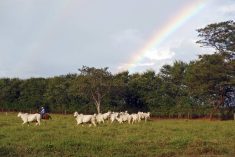HERBERT, Sask. – It looks like any other acreage you might find along the Trans-Canada Highway.
A horse and foal graze next to the house. There’s a red barn and a shop.
There isn’t a sign, no parking lot full of employee vehicles. But this is Fort Radisson Trading Post, a major manufacturer and exporter of western décor and giftware, owned by Tex and Val Rothenburger.
And it all began 26 years ago with horseshoe tricks – two horseshoes joined at the ends by links of chain with a silver ring around the middle. The trick is to twist the shoes and chains to remove the ring and then put it back together.
Read Also

Alberta cracks down on trucking industry
Alberta transportation industry receives numerous sanctions and suspensions after crackdown investigation resulting from numerous bridge strikes and concerned calls and letters from concerned citizens
The demand for the tricks led the Rothenburgers to let their creative talents flow. Their product line now totals 430.
“It’s all about what the public wants and what they’ll pay for,” said Val. “We’re still learning.”
Most of their products are original designs. Tex is a welder and he’s willing to try to make just about anything that Val comes up with.
From bookends to lamps to picture frames to wine holders to toilet paper holders and dinner bells, if it can be made with horses or spurs and has western style, the Rothenburgers have likely thought of it.
For example, a line of wine bottle holders is tailor made to suit each rodeo discipline. Votive candles fit into “spursuasion” holders.
“You use a spur to persuade a horse,” said Val. “You use a spursuasion to persuade a sweetheart.”
The most popular item is a cowboy table set that holds salt, pepper, toothpicks and napkins.
The Rothenburgers, then living in Radisson, Sask., began selling their items at craft shows and cowboy festivals. Then stores began to approach them and the business took off.
Tex said they were able to work on the products around 4-H, rodeo, hockey and horse shows that their children attended, and while they worked at other jobs.
“If we’d have been in retail that would’ve been impossible,” he said.
They remain a manufacturer and wholesaler because that’s their niche.
“We’ve built up a really big confidence in retailers in the western industry,” he said.
Val believes that even with all their products they haven’t flooded the market yet.
“The retail world is changing all the time,” she said. “We like to keep our product line fresh and we’ll eliminate the poor sellers.”
Interestingly, sales increased after they attached a paper label to their items, proclaiming them “Handmade in the West by Tex.”
While Tex welds and builds in the shop, Val labels, invoices, packs orders and keeps in touch with the customers from the home office and warehouse in the garage. They have a full-time employee and two part-time students. They also hire people on contract to do some of the piecework and assembly, including the Saskatchewan Abilities Council.
Their customer base is mainly in the western United States and Canada, but they also ship to Panama, Brazil, Japan, Sweden and Germany.
Val said they notice an interest from those who market cabin décor as well.
“You can only work 18 hours a day,” she said with a laugh.
They use private couriers and Canada Post to ship their products.
They get their horseshoes from Ontario or the eastern U.S. and spurs from offshore. Escalating steel costs have definitely dented their bottom line.
At this point, they say they aren’t really looking for more retailers. The first store that ever stocked their products still buys.
“We’re trying to take care of the customers we do have,” said Val.

















